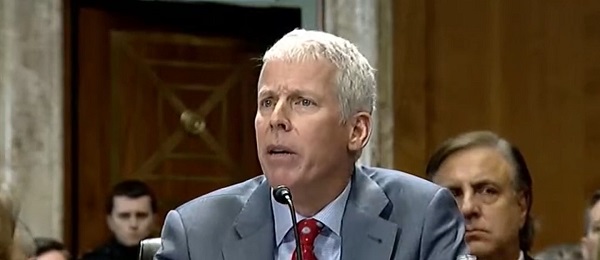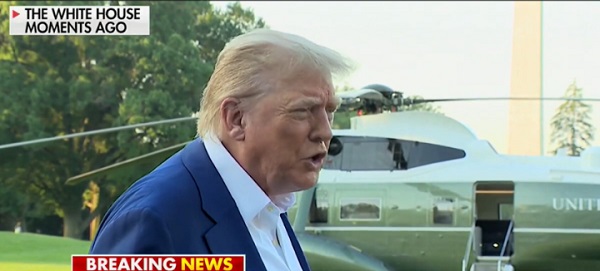Daily Caller
Key Trump Cabinet Nominees Face A Daunting Energy Policy Mess


From the Daily Caller News Foundation
By David Blackmon
Just so we can frame this for everyone in the room, China will build 100 new coal plants this year. There is not a clean energy race. There is an energy race.
After a week spent watching hours of the various Senate confirmation hearings for some of President-elect Donald Trump’s cabinet nominees, one compelling thought lingers with me more than any other: Does Democrat Sen. Mazie Hirono of Hawaii have a seat on every Senate committee?
The answer to that is “no,” but it seemed that way as the Senator began her questioning of nominees ranging from Pete Hegseth (Defense) to former Florida Attorney General Pam Bondi (Justice) to former Republican North Dakota Gov. Doug Burgum (Interior) to Chris Wright (Energy) by posing some iteration of the following question: “ … since you became a legal adult, have you ever made unwanted requests for sexual favors or committed any verbal or physical harassment or assault of a sexual nature?”
Sadly, Hirono’s farcical style of questioning turned out to be less of an exception than a rule among the Democratic members of these committees as the week wore on. Democrat Sen. Tim Kaine of Virginia ended his questioning of Hegseth by literally asking if he had ever beaten his wife, an obvious smear which Hegseth denied.
It was all sad to witness, a troubling indicator of the health of both the Democratic Party and the American Republic. But what it all revealed by Friday is that the Democrats are unlikely to claim any scalps from among this week’s slate of nominees. Where energy policy is concerned, that means that the three departments/agencies that are most impactful in that realm are likely to be led by former Republican Rep. Lee Zeldin of New York at the Environmental Protection Agency (EPA), Burgum at the Department of the Interior and Wright at the Department of Energy.
Seldom if ever in this country’s history have three more capable, knowledgeable and effective individuals been in positions of leadership to help reform and recover from the waste and misallocation of taxpayer dollars that have characterized President Joe Biden’s 4-year presidency.
I have written several times here that the inevitable outcome that will result from pretty much every aspect of the Biden Green New Deal policies will be to render America dependent on China for its energy security, due to Chinese dominance of global processing and supply chains for all forms of and raw materials for renewable energy and electric vehicles. This is obviously not a sustainable situation, and it is clear that Trump and his key nominees fully understand that reality.
U.S. dependency on foreign adversaries is not limited to China. One such area involving a different country holds high stakes related to the goal of a renaissance in nuclear power often touted by Republicans and some Democrats alike.
In a revealing exchange, Wright and Republican Sen. John Barrasso of Wyoming discussed America’s recent dependence on Russia, of all countries, for imports of enriched uranium. As Wright pointed out, this is a technology first invented in the United States, but our country has virtually no existing capacity for uranium enrichment today. This is, as Wright called it, “a sad state of affairs” that has been caused in large part by wrong-headed federal environmental and permitting policies.
Unfortunately, the Biden cure for this pressing energy security matter could be even worse. As U.S. and NATO sanctions have gradually shut down Russia’s exports of enriched uranium, the U.S. nuclear industry has become reliant on imports from — you guessed it — China.
“As those [sanctions] shut down Russian uranium … we see more imports from China,” Wright testified. “We need to get beyond that … without shutting down the nuclear power plants we have running today. It is an area that requires urgent action.”
In another revealing exchange, Trump’s nominee for Treasury Secretary, Scott Bessent, disagreed with Democrat Sen. Ron Wyden of Oregon about the Senator’s claim that the United States is involved in “an arms race on clean energy” with China.
“Senator Wyden, just so we can frame this for everyone in the room, China will build 100 new coal plants this year. There is not a clean energy race. There is an energy race,” Bessent replied. Truer words were never spoken, and it is impossible to win that energy race when the United States is increasingly dependent on China for its very energy needs.
These and other Trump nominees have an enormous mess to clean up from the profligate spending and waste of the Biden years. Fortunately for the country, their work begins Monday. Not a moment too soon.
David Blackmon is an energy writer and consultant based in Texas. He spent 40 years in the oil and gas business, where he specialized in public policy and communications.
conflict
‘They Don’t Know What The F*ck They’re Doing’: Trump Unloads On Iran, Israel


From the Daily Caller News Foundation
President Donald Trump expressed frustration Tuesday after Iran broke a ceasefire, prompting retaliation from Israel during a gaggle with reporters on the White House lawn.
Trump announced the ceasefire Monday, saying it was supposed to take effect at 1 a.m. Eastern Daylight Time, but Iran fired missiles at Israel Tuesday. Trump vented, saying the countries had been “fighting so long” they couldn’t make peace.
WATCH:
“You know, when I say okay, now you have 12 hours, you don’t go out in the first hour just drop everything you have on them,” Trump said. “So I’m not happy with them. I’m not happy with Iran either. But I’m really unhappy if Israel is going out this morning because the one rocket that didn’t land, that was shot, perhaps by mistake, that didn’t land, I’m not happy about that.”
“We basically have two countries that have been fighting so long and so hard, that they don’t know what the fuck they are doing,” Trump added.
The United States struck facilities in Fordow, Natanz and Isfahan related to Iran’s effort to develop nuclear weapons early Sunday morning local time, using as many as 14 GBU-57 Massive Ordnance Penetrators in the operation, which involved a 37-hour flight by seven B-2A Spirit bombers.
The American strikes came ten days after Israel launched a military operation targeting the Iranian nuclear program. Iran has responded with repeated missile attacks on Israeli cities and a refusal to resume negotiations over its efforts to pursue nuclear weapons.
Automotive
Supreme Court Delivers Blow To California EV Mandates


From the Daily Caller News Foundation
“The Supreme Court put to rest any question about whether fuel manufacturers have a right to challenge unlawful electric vehicle mandates”
The Supreme Court sided Friday with oil companies seeking to challenge California’s electric vehicle regulations.
In a 7-2 ruling, the court allowed energy producers to continue their lawsuit challenging the Environmental Protection Agency’s decision to approve California regulations that require manufacturing more electric vehicles.
“The government generally may not target a business or industry through stringent and allegedly unlawful regulation, and then evade the resulting lawsuits by claiming that the targets of its regulation should be locked out of court as unaffected bystanders,” Justice Brett Kavanaugh wrote in the majority opinion. “In light of this Court’s precedents and the evidence before the Court of Appeals, the fuel producers established Article III standing to challenge EPA’s approval of the California regulations.”
Kavanaugh noted that “EPA has repeatedly altered its legal position on whether the Clean Air Act authorizes California regulations targeting greenhouse-gas emissions from new motor vehicles” between Presidential administrations.
“This case involves California’s 2012 request for EPA approval of new California regulations,” he wrote. “As relevant here, those regulations generally require automakers (i) to limit average greenhouse-gas emissions across their fleets of new motor vehicles sold in the State and (ii) to manufacture a certain percentage of electric vehicles as part of their vehicle fleets.”
The D.C. Circuit Court of Appeals previously rejected the challenge, finding the producers lacked standing to sue.
“The Supreme Court put to rest any question about whether fuel manufacturers have a right to challenge unlawful electric vehicle mandates,” American Fuel & Petrochemical Manufacturers (AFPM) President and CEO Chet Thompson said in a statement.
“California’s EV mandates are unlawful and bad for our country,” he said. “Congress did not give California special authority to regulate greenhouse gases, mandate electric vehicles or ban new gas car sales—all of which the state has attempted to do through its intentional misreading of statute.”
-

 Business2 days ago
Business2 days agoOttawa Funded the China Ferry Deal—Then Pretended to Oppose It
-

 COVID-192 days ago
COVID-192 days agoNew Peer-Reviewed Study Affirms COVID Vaccines Reduce Fertility
-

 MAiD2 days ago
MAiD2 days agoCanada’s euthanasia regime is not health care, but a death machine for the unwanted
-

 Business1 day ago
Business1 day agoWorld Economic Forum Aims to Repair Relations with Schwab
-

 Alberta2 days ago
Alberta2 days agoThe permanent CO2 storage site at the end of the Alberta Carbon Trunk Line is just getting started
-

 Alberta2 days ago
Alberta2 days agoAlberta’s government is investing $5 million to help launch the world’s first direct air capture centre at Innisfail
-

 Business2 days ago
Business2 days agoMunicipal government per-person spending in Canada hit near record levels
-

 Business2 days ago
Business2 days agoA new federal bureaucracy will not deliver the affordable housing Canadians need






